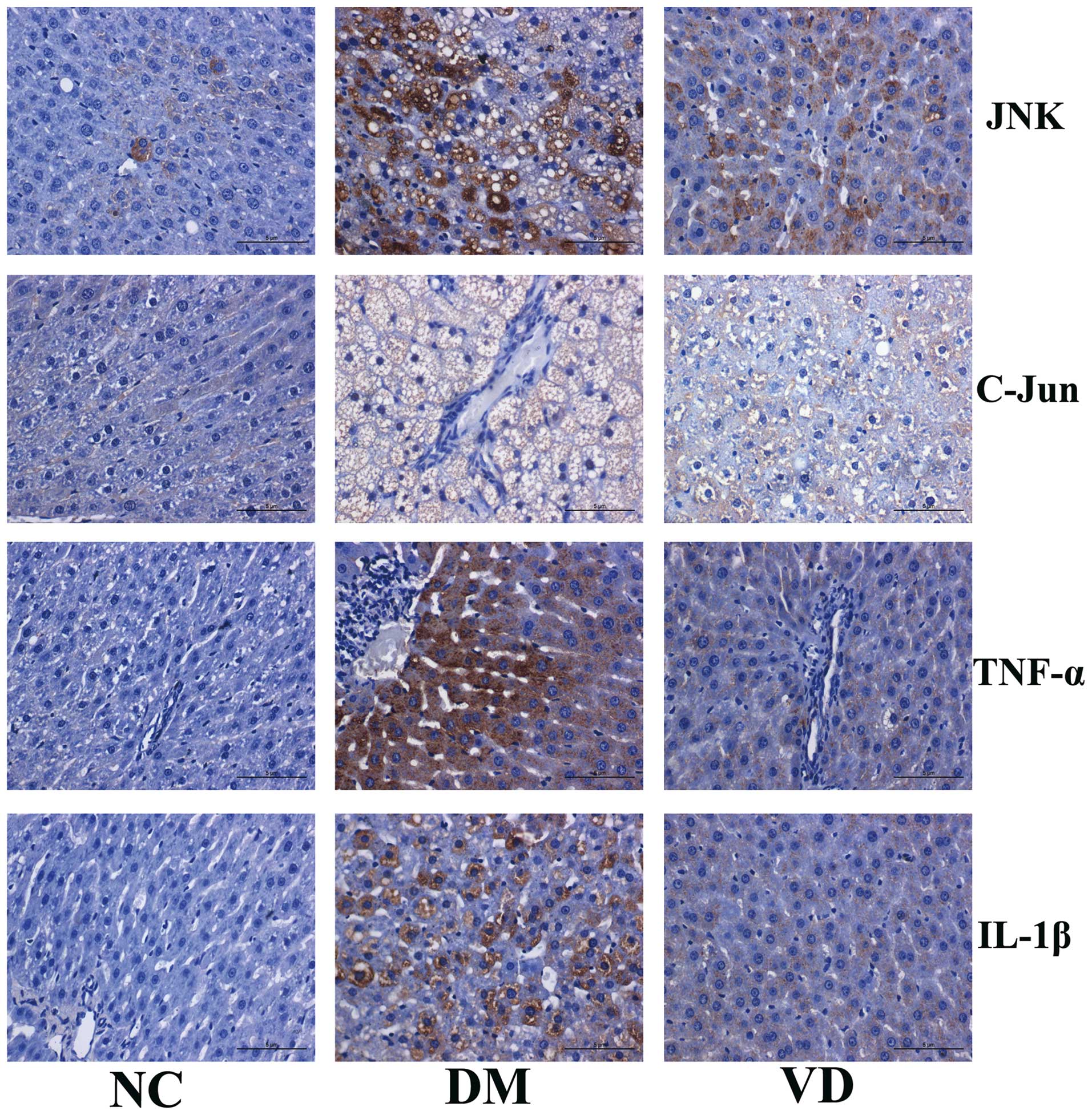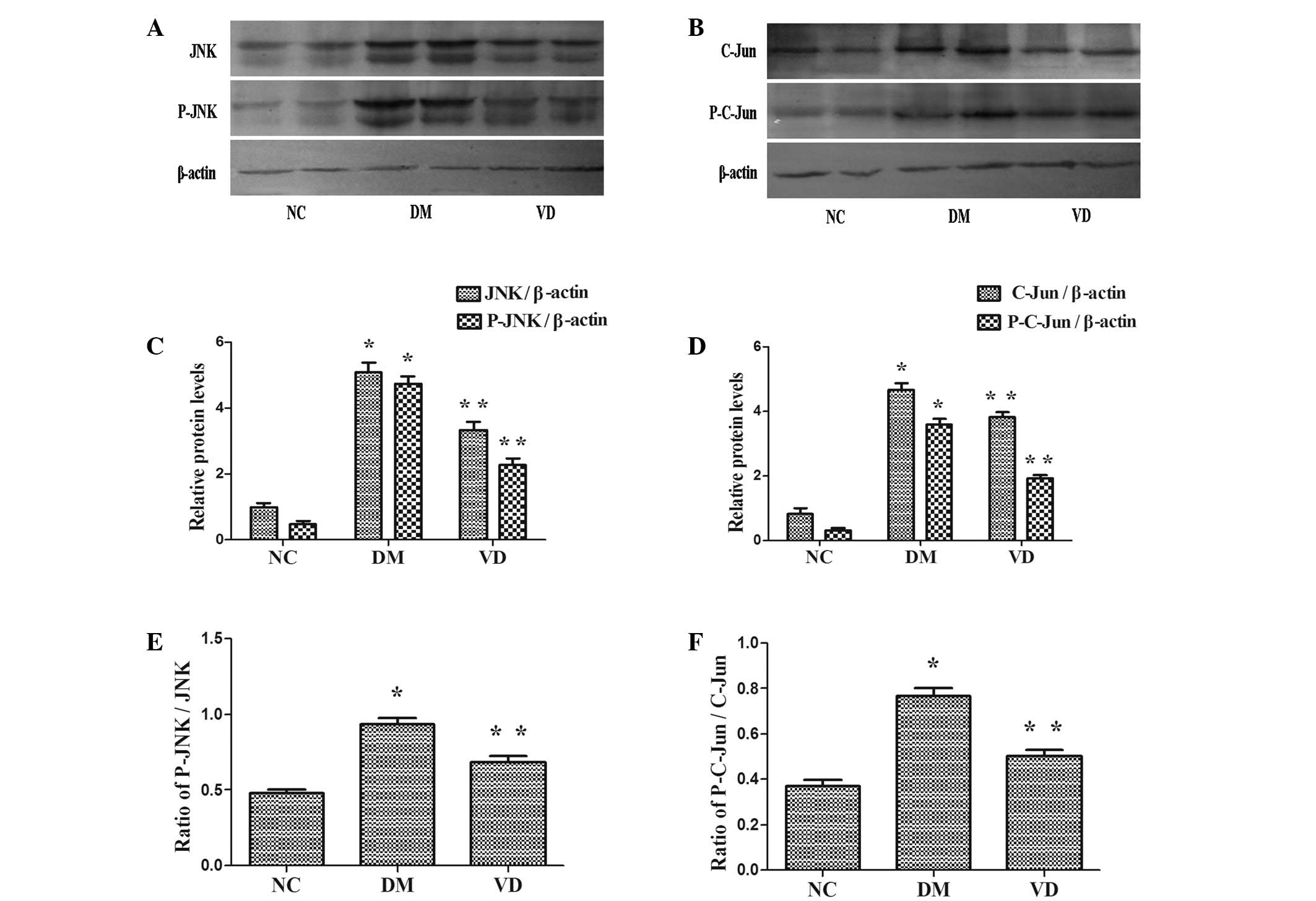|
1
|
Guadarrama-López AL, Valdés-Ramos R and
Martínez-Carrillo BE: Type 2 diabetes, PUFAs, and vitamin D: Their
relation to inflammation. J Immunol Res. 2014:8607032014.
View Article : Google Scholar : PubMed/NCBI
|
|
2
|
Flores M: A role of vitamin D in
low-intensity chronic inflammation and insulin resistance in type 2
diabetes mellitus? Nutr Res Rev. 18:175–182. 2005. View Article : Google Scholar : PubMed/NCBI
|
|
3
|
Chiu KC, Chu A, Go VL and Saad MF:
Hypovitaminosis D is associated with insulin resistance and beta
cell dysfunction. Am J Clin Nutr. 79:820–825. 2004.PubMed/NCBI
|
|
4
|
Pittas AG, Dawson-Hughes B, Li T, Van Dam
RM, Willett WC, Manson JE and Hu FB: Vitamin D and calcium intake
in relation to type 2 diabetes in women. Diabetes Care. 29:650–656.
2006. View Article : Google Scholar : PubMed/NCBI
|
|
5
|
Livak KJ and Schmittgen TD: Analysis of
relative gene expression data using real-time quantitative PCR and
the 2(−Delta Delta C(T)) Method. Methods. 25:402–408. 2001.
View Article : Google Scholar : PubMed/NCBI
|
|
6
|
Gregor MF and Hotamisligil GS:
Inflammatory mechanisms in obesity. Ann Rev Immunol. 29:415–445.
2011. View Article : Google Scholar
|
|
7
|
Sattar N, McCarey DW, Capell H and McInnes
IB: ‘Explaining how high-grade’ systemic inflammation accelerates
vascular risk in rheumatoid arthritis. Circulation. 108:2957–2963.
2003. View Article : Google Scholar : PubMed/NCBI
|
|
8
|
Knobler H, Zhornicky T, Sandler A, Haran
N, Ashur Y and Schattner A: Tumor necrosis factor-alpha-induced
insulin resistance may mediate the hepatitis C virus-diabetes
association. Am J Gastroenterol. 98:2751–2756. 2003. View Article : Google Scholar : PubMed/NCBI
|
|
9
|
Giulietti A, van Etten E, Overbergh L,
Stoffels K, Bouillon R and Mathieu C: Monocytes from type 2
diabetic patients have a pro-inflammatory profile.
1,25-Dihydroxyvitamin D(3) works as anti-inflammatory. Diabetes Res
Clin Pract. 77:47–57. 2007. View Article : Google Scholar : PubMed/NCBI
|
|
10
|
Targher G, Bertolini L, Scala L, Cigolini
M, Zenari L, Falezza G and Arcaro G: Associations between serum
25-hydroxyvitamin D3 concentrations and liver histology in patients
with non-alcoholic fatty liver disease. Nutr Metab Cardiovasc Dis.
17:517–524. 2007. View Article : Google Scholar : PubMed/NCBI
|
|
11
|
Laskin DL, Weinberger B and Laskin JD:
Functional heterogeneity in liver and lung macrophages. J Leukoc
Biol. 70:163–170. 2001.PubMed/NCBI
|
|
12
|
Korf H, Wenes M, Stijlemans B, Takiishi T,
Robert S, Miani M, Eizirik DL, Gysemans C and Mathieu C:
1,25-Dihydroxyvitamin D3 curtails the inflammatory and T cell
stimulatory capacity of macrophages through an IL-10-dependent
mechanism. Immunobiology. 217:1292–1300. 2012. View Article : Google Scholar : PubMed/NCBI
|
|
13
|
Alroy I, Towers TL and Freedman LP:
Transcriptional repression of the interleukin-2 gene by vitamin D3:
Direct inhibition of NFATp/AP-1 complex formation by a nuclear
hormone receptor. Mol Cell Biol. 15:5789–5799. 1995. View Article : Google Scholar : PubMed/NCBI
|
|
14
|
Ip YT and Davis RJ: Signal transduction by
the c-Jun N-terminal kinase (JNK)-from inflammation to development.
Curr Opin Cell Biol. 10:205–219. 1998. View Article : Google Scholar : PubMed/NCBI
|
|
15
|
Karin M and Gallagher E: From JNK to pay
dirt: Jun kinases, their biochemistry, physiology and clinical
importance. IUBMB Life. 57:283–295. 2005. View Article : Google Scholar : PubMed/NCBI
|
|
16
|
Nakatani Y, Kaneto H, Kawamori D, Hatazaki
M, Miyatsuka T, Matsuoka TA, Kajimoto Y, Matsuhisa M, Yamasaki Y
and Hori M: Modulation of the JNK pathway in liver affects insulin
resistance status. J Biol Chem. 279:45803–45809. 2004. View Article : Google Scholar : PubMed/NCBI
|
|
17
|
Yang R and Trevillyan JM: c-Jun N-terminal
kinase pathways in diabetes. Int J Biochem Cell Biol. 40:2702–2706.
2008. View Article : Google Scholar : PubMed/NCBI
|
|
18
|
Sharfi H and Eldar-Finkelman H: Sequential
phosphorylation of insulin receptor substrate-2 by glycogen
synthase kinase-3 and c-Jun NH2-terminal kinase plays a role in
hepatic insulin signaling. Am J Physiol Endocrinol Metab.
294:E307–E315. 2008. View Article : Google Scholar : PubMed/NCBI
|
|
19
|
Kaneto H: The JNK pathway as a therapeutic
target for diabetes. Expert Opin Ther Targets. 9:581–592. 2005.
View Article : Google Scholar : PubMed/NCBI
|
|
20
|
Tarantino G and Caputi A: JNKs, insulin
resistance and inflammation: A possible link between NAFLD and
coronary artery disease. World J Gastroenterol. 17:3785–3794. 2011.
View Article : Google Scholar : PubMed/NCBI
|
|
21
|
Chagas CE, Borges MC, Martini LA and
Rogero MM: Focus on vitamin D, inflammation and type 2 diabetes.
Nutrients. 4:52–67. 2012. View Article : Google Scholar : PubMed/NCBI
|
|
22
|
Tuncman G, Hirosumi J, Solinas G, Chang L,
Karin M and Hotamisligil GS: Functional in vivo interactions
between JNK1 and JNK2 isoforms in obesity and insulin resistance.
Proc Natl Acad Sci USA. 103:10741–10746. 2006. View Article : Google Scholar : PubMed/NCBI
|
|
23
|
Micheau O and Tschopp J: Induction of TNF
receptor I-mediated apoptosis via two sequential signaling
complexes. Cell. 114:181–190. 2003. View Article : Google Scholar : PubMed/NCBI
|
|
24
|
Seki E, Brenner DA and Karin M: A liver
full of JNK: Signaling in regulation of cell function and disease
pathogenesis, and clinical approaches. Gastroenterology.
143:307–320. 2012. View Article : Google Scholar : PubMed/NCBI
|
|
25
|
Schwabe RF, Uchinami H, Qian T, Bennett
BL, Lemasters JJ and Brenner DA: Differential requirement for c-Jun
NH2-terminal kinase in TNF alpha-and Fas-mediated apoptosis in
hepatocytes. FASEB J. 18:720–722. 2004.PubMed/NCBI
|
|
26
|
Li H, Xie H, Fu M, Li W, Guo B, Ding Y and
Wang Q: 25-hydroxyvitamin D3 ameliorates periodontitis by
modulating the expression of inflammation-associated factors in
diabetic mice. Steroids. 78:115–120. 2013. View Article : Google Scholar : PubMed/NCBI
|
|
27
|
Hotamisligil GS, Shargill NS and
Spiegelman BM: Adipose expression of tumor necrosis factor-alpha:
Direct role in obesity-linked insulin resistance. Science.
259:87–91. 1993. View Article : Google Scholar : PubMed/NCBI
|
|
28
|
Bieghs V and Trautwein C: The innate
immune response during liver inflammation and metabolic disease.
Trends Immunol. 34:446–452. 2013. View Article : Google Scholar : PubMed/NCBI
|
|
29
|
Negrin KA, Roth Flach RJ, Di Stefano MT,
Matevossian A, Friedline RH, Jung D, Kim JK and Czech MP: IL-1
signaling in obesity-induced hepatic lipogenesis and steatosis.
PloS One. 9:e1072652014. View Article : Google Scholar : PubMed/NCBI
|
|
30
|
Larsen CM, Faulenbach M, Vaag A, Vølund A,
Ehses JA, Seifert B, Mandrup-Poulsen T and Donath MY:
Interleukin-1-receptor antagonist in type 2 diabetes mellitus. N
Engl J Med. 356:1517–1526. 2007. View Article : Google Scholar : PubMed/NCBI
|
|
31
|
Moore M, Piazza A, Nolan Y and Lynch MA:
Treatment with dexamethasone and vitamin D3 attenuates
neuroinflammatory age-related changes in rat hippocampus. Synapse.
61:851–861. 2007. View Article : Google Scholar : PubMed/NCBI
|
|
32
|
Ozcan U, Cao Q, Yilmaz E, Lee AH, Iwakoshi
NN, Ozdelen E, Tuncman G, Görgün C, Glimcher LH and Hotamisligil
GS: Endoplasmic reticulum stress links obesity, insulin action, and
type 2 diabetes. Science. 306:457–461. 2004. View Article : Google Scholar : PubMed/NCBI
|
|
33
|
Nguyen MT, Satoh H, Favelyukis S,
Babendure JL, Imamura T, Sbodio JI, Zalevsky J, Dahiyat BI, Chi NW
and Olefsky JM: JNK and tumor necrosis factor-alpha mediate free
fatty acid-induced insulin resistance in 3T3-L1 adipocytes. J Biol
Chem. 280:35361–35371. 2005. View Article : Google Scholar : PubMed/NCBI
|
|
34
|
Meeker S, Seamons A, Paik J, Treuting PM,
Brabb T, Grady WM and Maggio-Price L: Increased dietary vitamin D
suppresses MAPK signaling, colitis, and colon cancer. Cancer Res.
74:4398–4408. 2014. View Article : Google Scholar : PubMed/NCBI
|
|
35
|
Zhou QG, Hou FF, Guo ZJ, Liang M, Wang GB
and Zhang X: 1,25-Dihydroxyvitamin D improved the free
fatty-acid-induced insulin resistance in cultured C2C12 cells.
Diabetes Metab Res Rev. 24:459–464. 2008. View Article : Google Scholar : PubMed/NCBI
|
|
36
|
Scragg R, Sowers M and Bell C: Third
National Health and Nutrition Examination Survey: Serum
25-hydroxyvitamin D, diabetes, and ethnicity in the third national
health and nutrition examination survey. Diabetes Care.
27:2813–2818. 2004. View Article : Google Scholar : PubMed/NCBI
|
|
37
|
von Hurst PR, Stonehouse W and Coad J:
Vitamin D supplementation reduces insulin resistance in South Asian
women living in New Zealand who are insulin resistant and vitamin D
deficient-a randomised, placebo-controlled trial. Br J Nutr.
103:549–555. 2010. View Article : Google Scholar : PubMed/NCBI
|
|
38
|
Hotamisligil GS: Inflammation and
metabolic disorders. Nature. 444:860–867. 2006. View Article : Google Scholar : PubMed/NCBI
|
|
39
|
Nugent DA, Smith DM and Jones HB: A review
of islet of Langerhans degeneration in rodent models of type 2
diabetes. Toxicol Pathol. 36:529–551. 2008. View Article : Google Scholar : PubMed/NCBI
|
|
40
|
Meerza D, Naseem I and Ahmed J: Effect of
1,25(OH)2 vitamin D3 on glucose homeostasis
and DNA damage in type 2 diabetic mice. J Diabetes Complications.
26:363–368. 2012. View Article : Google Scholar : PubMed/NCBI
|

















